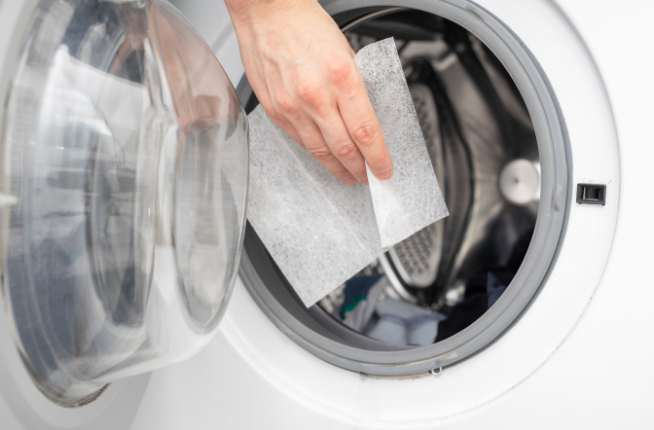Palm Coast Local
Locals Helping Locals

Alternative's to using fabric softeners
- Details
- Written by: Palm Coast Local
- Parent Category: Business Blog
- Category: Consumer Alert

Why Fabric Softeners Might Be a Problem
1. Lingering Odors & Mold Growth
Fabric softeners can block moisture absorption, making towels and clothes less effective at drying. This trapped moisture can lead to musty odors and potential mold growth—even when no visible mold is present.
🔹 Towels & Washcloths: Instead of absorbing water, softened towels repel it, leading to a damp smell.
🔹 Undergarments & Sportswear: These fabrics need to breathe, but softener buildup can trap bacteria and moisture, causing irritation and odors.
2. Shortens the Life of Your Clothes
Fabric softeners contain chemicals that can coat and weaken fibers over time.
🚫 Avoid softeners on:
✔ Spandex & Elastic: Breaks down stretchy fabrics, reducing durability.
✔ Sportswear & Performance Fabrics: Reduces moisture-wicking ability.
✔ Microfiber & Towels: Prevents proper absorption.
3. Fabric Softeners Are No Longer Necessary
Originally developed in the early 20th century to soften rough cotton fibers after dyeing, fabric softeners became widely marketed as a "laundry essential." However, modern fabrics are designed for comfort without the need for chemical softeners. So why keep using them?
4. Chemical Buildup & Health Concerns
Traditional fabric softeners contain fragrances, surfactants, and preservatives that can:
❌ Irritate sensitive skin & trigger allergies
❌ Leave a residue on clothing, affecting breathability
❌ Cause buildup in washing machines, clogging pipes & reducing efficiency
If you're looking for softer clothes without the downsides, consider these eco-friendly and effective alternatives.


 PalmCoastLocal.com
PalmCoastLocal.comSafer & Natural Alternatives to Fabric Softeners
1. White Vinegar (Best All-Around Solution)
✅ Softens fabrics
✅ Reduces static
✅ Eliminates odors
🧴 How to use: Add ½ cup of white vinegar to the rinse cycle. Don’t worry—the vinegar smell disappears once clothes dry!
2. Baking Soda
✅ Neutralizes odors
✅ Maintains fabric quality
✅ Softens clothes naturally
🧴 How to use: Add ½ cup of baking soda to the wash cycle along with detergent.
3. Wool Dryer Balls
✅ Reusable & eco-friendly
✅ Fluffs up clothes
✅ Reduces static & drying time
🧴 How to use: Toss 3-6 wool dryer balls into the dryer with your laundry.
4. Air Drying
✅ 100% natural
✅ Helps clothes last longer
✅ Sunlight has antibacterial properties
🧴 How to use: Hang clothes outside or on an indoor drying rack.
5. Hair Conditioner (DIY Softener)
✅ Mimics fabric softener without harsh chemicals
✅ Leaves clothes feeling soft
🧴 How to use: Mix a small amount of hair conditioner with water and add it to the rinse cycle.
6. Essential Oils for Fresh Scent
✅ Chemical-free fragrance
✅ Natural antibacterial properties
🧴 How to use: Add a few drops of lavender, eucalyptus, or tea tree oil to a damp cloth and toss it in the dryer. (Test on colored fabrics first!)
7. Aluminum Foil Ball (Static Reducer)
✅ Simple & long-lasting
✅ Reduces static cling
🧴 How to use: Crumple aluminum foil into a tight ball and use it in the dryer. It lasts multiple loads!
8. Odor Ban for Tough Smells
✅ Great for pet odors, outdoor work clothes, and strong smells
✅ Disinfects while softening
🧴 How to use: Add ½ to 1 cup to the rinse cycle as needed. Always follow the instructions.
The Bottom Line: Do You Really Need Fabric Softener?
Fabric softeners may smell nice, but they come with drawbacks that can affect your clothes, washing machine, and health. Instead, consider natural alternatives that keep fabrics soft without the buildup or chemical exposure.
Next time you do laundry, skip the softener—your skin, clothes, and washing machine will thank you! 🚿💚👕
Would you switch to a natural alternative or stick with fabric softener? Share your thoughts below! ⬇️
Add comment